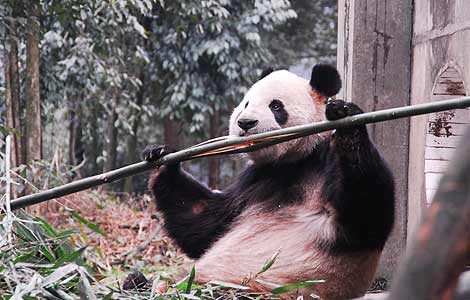Macaques are greeting guests at games city
Updated: 2011-09-11 07:42
By Tiffany Tan (China Daily)
|
|||||||||
GUIYANG - This capital of the southwestern province of Guizhou, where the ninth Chinese Traditional Games of Ethnic Nationalities opened on Saturday, is a city of surprises. How many urban parks do you know that have hundreds of monkeys freely roaming around?
The monkey lair is Mount Qianling Park, in Northwestern Guiyang. A forested park that reaches an elevation of almost 1,400 meters - in a Chinese capital city - is not something you see every day. But what's even more surreal is that it's home to some 300 macaques, which openly wander the 426-hectare park and at certain times are practically nose-to-nose with tourists.
During my visit Friday afternoon, I saw close to 100 monkeys within the first hour. A few were perched on a tree beside the park entrance, waiting to score food from visitors. As my guide and I walked up the stone steps leading to Mount Qianling's peak, we saw a couple hopping up the steps, and another perched on a rail post.
We passed one sitting in the middle of the paved park road for some pre-Mid-Autumn Festival celebrating, munching on a bunch of mooncakes from passersby. Another stole my bottled water and clambered up a tree, where it deftly twisted off the cap and drank thirstily.
"During weekends when there are more tourists, the monkeys will have more choices and they will snatch juices instead of water," said Zhang Yu, my guide, whose parents are avid park visitors and hikers.
But we saw the single, biggest congregation of monkeys in the late afternoon, courtesy of the Qianling Animal Protection Organization. Established in 1997 and comprised mainly of retirees, its mission is to feed the macaques daily. On Friday, a handful of members attracted about 70 monkeys, including mothers still nursing their young, and gave the animals peaches, corn kernels, peanuts, cucumber and packaged chocolate pies. This despite signs all over the park saying, "Do not feed the monkeys."
"The food they get from the park is not enough," 52-year-old Zhou Zeqi, head of the animal protection organization, said. "If they get hungry, they might venture out into the city roads and hurt people."
Zhou made no secret of the fact that her group's standpoint puts it at odds with the park authorities. One reason may be that members of the "nature organization" liberally littered plastic food wrappers as they fed the monkeys along the park roads.
The macaques, which have been in the park since it was built in 1957, were clearly more familiar and friendlier with the members of Zhou's group. But the primates, no matter how much the park allows them to get close to people, are still wild animals and should not be mistaken for pets - or stupid creatures that can be taunted then easily shooed off.
"From 2004 to the present, there have been 5,927 incidents of monkeys hurting humans, and more than 20 of the victims had to be taken to hospital for treatment," said a park sign.
Whenever visitors buy their 5-yuan ($0.78) tickets to enter Mount Qianling Park, they're automatically offered medical insurance for an additional 1 yuan. This does not come as a surprise.
China Daily











